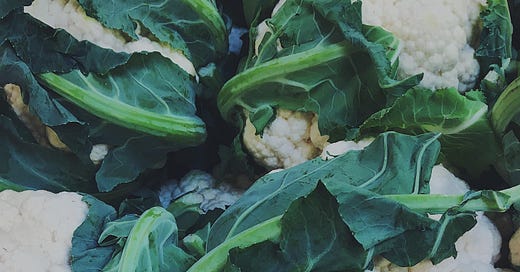By eating foods that are beneficial to our gut health, we may also get some mental health benefits too
It's Mental Health Month, and mental health is health! Importantly, please note that this is NOT a recommendation to quit self care, therapy, and/or medications and just eat more fiber.
In the fall, I had the opportunity to help create a catering menu for some mental health-related work events.
That task led me to explore more of the connection between the foods we eat and our mental health, so I am sharing some of what I learned with you all today in honor of Mental Health Awareness month.
Your brain and gastrointestinal system are intimately connected and communicate bidirectionally in what is often referred to as the gut-brain axis.
It is likely that there are many mechanisms by which the gut and brain influence each other. For example, scientists have found that gut bacteria produce mood-regulating neurotransmitters like serotonin, dopamine, and GABA.1 Inflammation and dysbiosis (an imbalanced microbiome) in the gut have been linked to several mental illnesses, including anxiety and depression.2
Researchers John Cryan and Ted Dinan at the University of Ireland in Cork coined the term “psychobiotics” to refer to bacteria that might confer a mental health benefit by affecting the microbiota of the host organism.34
Caring for your digestive tract, specifically, the population of beneficial microbes in your large intestine has the potential to have a positive impact on your mental health.
But please note that this is not meant to suggest that other things we do to care for our mental health, like self-care, going to therapy, and/or taking medications, can (or should) be replaced by simply eating foods that are beneficial for gut health!
This is just another tool in your toolkit of many things that can be supportive of your mental well-being.
The simplest way to begin to make beneficial changes to your gut microbiome is through your diet by incorporating foods that contain prebiotics and probiotics.5
Focus on foods that are appealing and accessible to you, prioritizing fiber-rich foods first.
Prebiotics: fiber-rich foods that are the preferred fuel sources for the beneficial bacteria in your microbiome, to help keep them strong so that they can fight off harmful bacteria
Fruits, vegetables, whole grains, beans, nuts (so many options!)
Probiotics: foods that contain beneficial bacteria (foods are recommended over probiotic supplements, which are unregulated by the FDA)
Kefir, yogurt, kombucha, sauerkraut, kvass, kimchi, miso, tempeh, and certain cheeses which have been aged but not pasteurized
Kohn, D. (2015, June 24). When Gut Bacteria Hijack the Brain. The Atlantic. https://www.theatlantic.com/health/archive/2015/06/gut-bacteria-on-the-brain/395918/
Clapp, M., Aurora, N., Herrera, L., Bhatia, M., Wilen, E., & Wakefield, S. (2017). Gut microbiota’s effect on mental health: The gut-brain axis. Clinics and Practice, 7(4), 987. https://doi.org/10.4081/cp.2017.987
Anderson, S. C., Cryan, J. F., & Dinan, T. (2017). The Psychobiotic Revolution: Mood, Food, and the New Science of the Gut-Brain Connection (1st edition). National Geographic.
Lyte, M. (2013). Microbial Endocrinology in the Microbiome-Gut-Brain Axis: How Bacterial Production and Utilization of Neurochemicals Influence Behavior. PLOS Pathogens, 9(11), e1003726. https://doi.org/10.1371/journal.ppat.1003726
Prebiotics and Probiotics Creating a Healthier You. (n.d.). Retrieved November 21, 2022, from https://www.eatright.org/food/vitamins-and-supplements/nutrient-rich-foods/prebiotics-and-probiotics-creating-a-healthier-you




